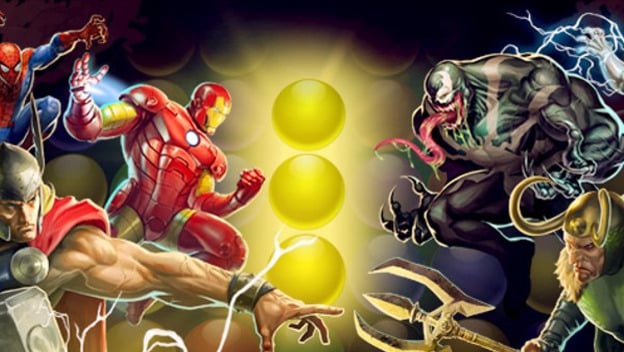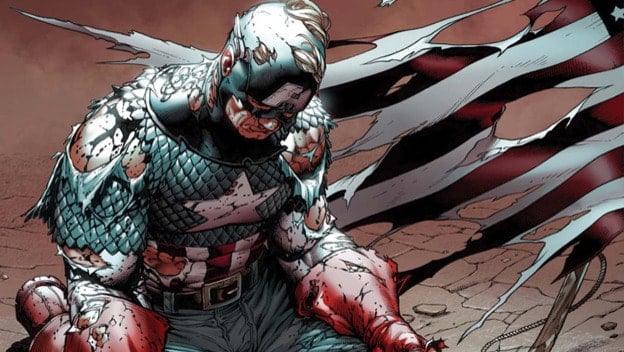Six years ago, a little game called Puzzle Quest burst onto the gaming scene, becoming a surprise hit. It combined match-3 puzzle gameplay with RPG mechanics and a lighthearted story, an addictive mixture that hooked traditional and casual gamers alike. Developer Infinite Interactive was never quite able to fully recapture Puzzle Quest ‘s success with the game’s spinoffs and sequels, and put the property out to pasture for a while after 2010’s Puzzle Quest 2 .
Enter Marvel Puzzle Quest , which has been out for mobile devices for several months and just appeared on Steam as a free-to-play title. The free-to-play part itself raises warning signals, and the fact that the game was developed by Demiurge instead of Infinite Interactive (albeit with Infinite’s permission and consultation) certainly lowers expectations for the game. Still, as a former Puzzle Quest addict, I felt compelled to investigate the title.
The tragedy of Marvel Puzzle Quest is that it’s actually a rather entertaining game that is buried beneath layers upon layers of obnoxious microtransaction incentives. The player controls a team of Marvel superheroes like Iron Man, Black Widow, Hawkeye, and Storm. Each hero has a set of superpowers that allow them to manipulate the colored gems on the game field or damage the enemy in various ways. The player can take three of these heroes at a time into a match-3 puzzle battle against up to three enemies. Every matched or shattered gem takes health from the enemies, who of course do their own damage against the player.
Along with pre-made story modes, the Marvel Puzzle Quest team runs regular events that offer new storylines and heroes to collect. There are even player versus player tournaments that, while not active person versus person battles, allow players to challenge each others superhero teams.
Although it lacks the complexity of the original Puzzle Quest , the Marvel edition’s twists provide plenty of entertainment and promise deeper gameplay as players amass a team of varied heroes who can work with each other. Here, however, is where the game’s free-to-play scheme puts up giant roadblocks that hamper player enjoyment.
Most of the RPG features, such as character and ability development, have been stripped away from gameplay and turned into luck- and purchase-based bonuses. Players don’t earn experience for winning battles. Instead, leveling up characters requires three steps that involve collectable comic book covers and two kinds of consumable currency. The comic book covers are only readily available for a small number of heroes and the supply of the most important consumable currency type is highly constrained. To top off the character development wall, there’s a timed healing system that increases exponentially as characters level up, asking players to pay up or literally wait for hours before characters heal up between battles.
The game’s payment scheme also works against any sense of fairness in the player versus player tournaments, as building up the most powerful characters is very easy with a large cash infusion and next to impossible otherwise. The advantage of being a thinking human against another player’s AI-controlled team is wiped out by the sheer numeric advantage that buffed-up rare heroes (only realistically available via cash payments) bring to the table.
Marvel Puzzle Quest hardly even offers the early, stress-free experience that many free-to-play games provide before that pay wall is thrown up. After only an hour or two, players will start to hit these walls and decide whether to figure out how to work around them, shrug and abandon the game or pay up. Since everything the game offers is consumable, paying up involves a hefty amount of money to fully develop even a single hero or to get around the healing timers. Puzzle Quest battles are best when they’re dangerous and challenging, so attempting to get the most out of the game runs players directly against that healing timer wall as their characters exit a single short battle with low health.

As it is today, Marvel Puzzle Quest is a decent game to play for ten to fifteen minutes a day, but attempting to fully enjoy it for free or while paying even a small, sustainable amount of money is a chore at best. This is not a sustainable free-to-play model in the least, and while a few trendy mobile game titles get away with this kind of monetization scheme, gamers in general are tiring of such obvious cash grabs. The PC gaming audience in particular has little patience for these things, especially when there are so many affordable full retail games available on Steam.
The PC version of Marvel Puzzle Quest is still listed as a work in progress, which is why this is a mournful editorial rather than an official review. If we’re lucky, Demiurge and D3 Publisher will rethink the game’s monetization scheme so it’s more carrot and less stick. It’s unlikely that the game as it’s designed could be turned into a retail release, but even a few tweaks could tip the balance toward a sustainable and respectful free-to-play formula. I fear that won’t happen, though, and Marvel Puzzle Quest will end up with many of its brethren, condemned to the dustbin of free-to-play games that enjoyed a brief initial surge of player interest before ultimately being abandoned.
